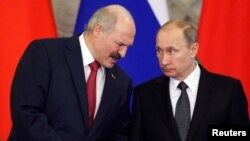Belarus said Thursday it suspected Russia was trying to restore a formal border zone between the two countries, a move it said flouted agreements on freedom of movement and trade and raised questions about Moscow’s real intent.
Belarus spoke out after the publication of three decrees signed by Alexander Bortnikov, the head of Russia’s Federal Security Service (FSB), that ordered border zones to be set up in three Russian regions adjacent to Belarus.
In the years after the 1991 Soviet collapse, border controls existed but were removed as the two countries, both former Soviet republics, grew closer again.
Zones scrapped in 1990s
“The Russian side took a decision to set up border zones on the frontier with Belarus without advance warning, flying in the face of all existing agreements,” Maria Vanshina, a spokeswoman for the Belarusian Foreign Ministry, said Thursday. “Many people get the impression that these actions are designed to restore full control over the Belarusian-Russian border, something that was scrapped more than 20 years ago.”
Russia and Belarus have long been part of a political and economic union that provides for open borders and allows citizens from both nations to work and settle in the other without going through immigration formalities.
But relations have soured since Belarusian President Alexander Lukashenko criticized Moscow’s annexation of Ukraine’s Crimea in 2014.
Since then, the two have fallen out over gas pricing, with Russia cutting oil deliveries to Belarus, while Russian moves to try to expand its military presence in Belarus have come to nothing.
Lukashenko, who has often played Russia and the West off against each other to extract concessions from each, has responded by becoming friendlier with the West.
Belarus turns to West
Belarus said last month it would allow visa-free entry for the citizens of 80 countries, including the United States and the European Union, for visits of up to five days.
Soon afterward, Russia’s FSB border guards were ordered to mark up border zones in three Russian regions next to Belarus, to erect signs indicating their status, and to fix the exact place and time when people and vehicles could enter the areas.
The Russian Foreign Ministry did not immediately respond to a Reuters request for comment Thursday.





